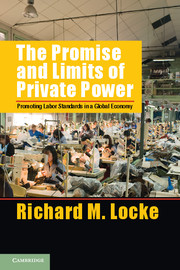Book contents
- Frontmatter
- Contents
- Acknowledgments
- 1 The Rise of Private Voluntary Regulation in a Global Economy
- 2 The Promise and Perils of Private Compliance Programs
- 3 Does Private Compliance Improve Labor Standards?
- 4 Capability Building and Its Limitations
- 5 Alternative Approaches to Capability Building
- 6 Are We Looking in The Wrong Place?
- 7 Complements or Substitutes?
- Conclusion
- Bibliography
- Index
- References
3 - Does Private Compliance Improve Labor Standards?
Lessons from Nike
Published online by Cambridge University Press: 05 May 2013
- Frontmatter
- Contents
- Acknowledgments
- 1 The Rise of Private Voluntary Regulation in a Global Economy
- 2 The Promise and Perils of Private Compliance Programs
- 3 Does Private Compliance Improve Labor Standards?
- 4 Capability Building and Its Limitations
- 5 Alternative Approaches to Capability Building
- 6 Are We Looking in The Wrong Place?
- 7 Complements or Substitutes?
- Conclusion
- Bibliography
- Index
- References
Summary
What role can corporate codes of conduct and private compliance programs play in improving working conditions in global supply chains? How does this system of private voluntary regulation relate to other strategies and regulatory approaches aimed at enforcing labor standards? This chapter builds on the more general overview presented in Chapter 2 and addresses these questions through a detailed case study of Nike, the world's largest athletic footwear and apparel company. Given the central and highly controversial place Nike occupies in debates over globalization and labor standards, it serves in many ways as a “crucial case” through which to explore the effect of private compliance initiatives on labor standards in global supply chains. Using a unique data set based on factory audits of working conditions in more than 900 of Nike's suppliers located across fifty countries, plus field research at Nike suppliers in China, Turkey, Mexico, and the United States, this chapter illustrates both the potential and limitations of this model of private voluntary regulation.
The core empirical analysis presented in this chapter addresses three basic questions. First, how bad (or good) are working conditions at Nike's various suppliers? Second, what determines variation in working conditions among these suppliers? (In other words, what accounts for the greatly differing working conditions across factories producing more or less the same products for the same brand?) We need to understand the baseline working conditions (and the determinants of these conditions) at these factories to assess whether private compliance initiatives have any effect on improvements in labor standards. And third, are working conditions improving over time at these factories, and if so, what role does private compliance play in these improvements? The case study of Nike will shed light on the limits of traditional private compliance programs and also elucidate how under certain conditions – long-term relationships, frequent interactions, and strategic partnerships between global buyers like Nike and their suppliers – these private initiatives can promote significant improvements in labor standards.
Information
- Type
- Chapter
- Information
- The Promise and Limits of Private PowerPromoting Labor Standards in a Global Economy, pp. 46 - 77Publisher: Cambridge University PressPrint publication year: 2013
References
Accessibility standard: Unknown
Why this information is here
This section outlines the accessibility features of this content - including support for screen readers, full keyboard navigation and high-contrast display options. This may not be relevant for you.Accessibility Information
- 1
- Cited by
